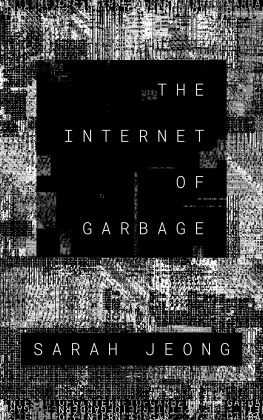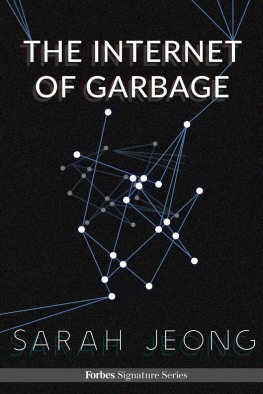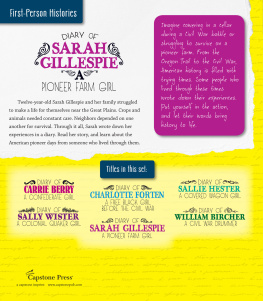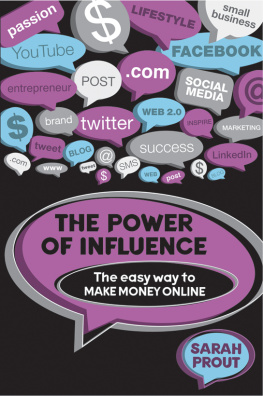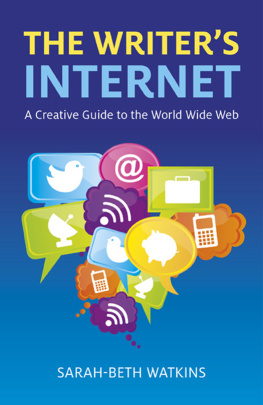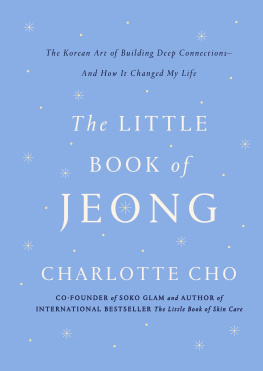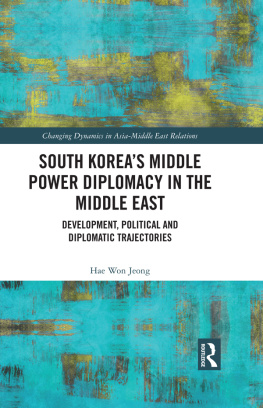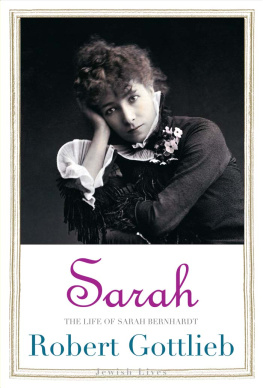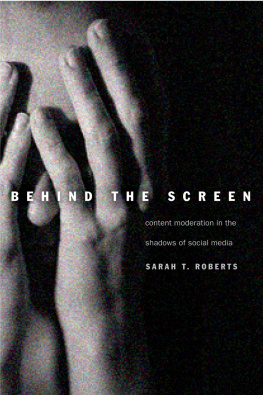Sarah Jeong - The internet of grabage
Here you can read online Sarah Jeong - The internet of grabage full text of the book (entire story) in english for free. Download pdf and epub, get meaning, cover and reviews about this ebook. year: 2018, publisher: Vox Media, Inc., genre: Romance novel. Description of the work, (preface) as well as reviews are available. Best literature library LitArk.com created for fans of good reading and offers a wide selection of genres:
Romance novel
Science fiction
Adventure
Detective
Science
History
Home and family
Prose
Art
Politics
Computer
Non-fiction
Religion
Business
Children
Humor
Choose a favorite category and find really read worthwhile books. Enjoy immersion in the world of imagination, feel the emotions of the characters or learn something new for yourself, make an fascinating discovery.
- Book:The internet of grabage
- Author:
- Publisher:Vox Media, Inc.
- Genre:
- Year:2018
- Rating:3 / 5
- Favourites:Add to favourites
- Your mark:
- 60
- 1
- 2
- 3
- 4
- 5
The internet of grabage: summary, description and annotation
We offer to read an annotation, description, summary or preface (depends on what the author of the book "The internet of grabage" wrote himself). If you haven't found the necessary information about the book — write in the comments, we will try to find it.
The internet of grabage — read online for free the complete book (whole text) full work
Below is the text of the book, divided by pages. System saving the place of the last page read, allows you to conveniently read the book "The internet of grabage" online for free, without having to search again every time where you left off. Put a bookmark, and you can go to the page where you finished reading at any time.
Font size:
Interval:
Bookmark:
The Internet of Garbage
2015, 2018 by Sarah Jeong
Cover and Illustrations by William Joel for The Verge, 2018 Vox Media, Inc.
All rights reserved.
The Verge Edition 1.5 August 2018
Published by Vox Media, Inc.
www.theverge.com
ISBN: 978-0-692-18121-8
Preface
- SWATting
In October 2016, my friend Lana Swartz invited me to be a guest speaker in her media studies class at the University of Virginia. The Internet of Garbage had been assigned as reading that week for her students, who were mostly undergraduate juniors. I talked to them for a little bit about internet harassment and spam, but at some point, I let loose with what had been weighing on my mind for months. If I rewrote The Internet of Garbage, I told them, it wouldnt focus on online harassment at all. It would focus on fake news.
Since October 2016, the term fake news has been co-opted and stretched beyond recognizability. It was meant to describe a category of viral falsehood churned out and advertised on social networks and search engines to profit from ad dollarsa disturbing phenomenon that some have sought to link to foreign propaganda efforts and election interference. Fake news is now the catchphrase of those who would undermine the legitimacy and freedom of the press, a refrain similar to the cry of Lgenpresse in years past.
But in October 2016, all that was yet to happen. I was fixated on how search engine optimization and ad dollars had fueled an economy of lies. I was particularly glued to the virality of alternate historiesfor example, the Irish slaves meme, which conflates indentured servitude with chattel slavery by reconstructing an alternate history made of misinterpreted or made-up sources.
I told the UVA class that this had less to do with something evil or broken about the internet and more to do with our collective inability to come to grips with the American legacy of slavery and white supremacy. At the time, I didnt have any answers for what to do about literal fake news or white supremacist mythologies. Two years later, Im still thinking hard about it.
The year after my guest appearance in that class, two Portlanders were killed on the train stop closest to where I lived, stabbed by a white nationalist who had been harassing two girls, one of whom was in hijab. Months later, Charlottesvillethe home of the University of Virginiawas convulsed with white supremacist violence, resulting in the killing of Heather Heyer.
I published The Internet of Garbage in 2015, and in its original form, it stands as a testament to an internet that used to beone that flickered out of existence as platforms solidified into monopolistic silos and the fragile American pact of free speech shattered in the wake of the 2016 election.
I described the marketplace of ideas in my book, criticizing it as something that has never truly existed for everyone across race and gender. But I did not criticize it enough. In 2018, the marketplace of ideas is sick unto death, close to being replaced by an SEO nightmare populated with the intellectual equivalents of malware, viruses, and banking scams.
I think The Internet of Garbage still provides a useful framework to begin to talk about our new dystopia, and it continues to be surprisingly relevant in many ways. But I wrote the book with a tone of optimism I did not feel even at the time, hoping that by reaching the well-meaning policy teams across Silicon Valley, I might be able to spark change for the better.
Not only did that change never quite solidify, but the coordinated, orchestrated harassment campaigns of Gamergate that I very briefly touch on in Chapter Two have since overtaken our national political and cultural conversations. These twisted knots of lies, deflection, and rage are not just some weird and terrible online garbage. They shadow executive orders, court rulings, even the newly appointed judiciary. They will haunt us for years to come. We are all victims of fraud in the marketplace of ideas.
I hope that in the very near future, I will be putting out a second edition of The Internet of Garbage. In that future edition, I hope to grapple with advertising incentives, engagement traps, international propaganda wars, the American crisis in free speech coinciding with the rise of platform power, and search engine optimization as the new paradigm of speech.
In the meantime, I am putting out The Internet of Garbage 1.5 as an interim edition. I wish it were more helpful in our present reality. But as imperfect a tool as it is, I figure we all need as much help as we can get.

Contract workers in San Francisco, processing thousands of complaints a day. Sweatshops in the Philippines, where outsourced labor decides whats obscene and whats permissible in a matter of seconds. Teams of anti-spam engineers in Mountain View, adapting to the latest wave of bots. An unpaid moderator on Reddit, picking out submissions that violate guidelines.
So much of the internet is garbage, and much of its infrastructure and many work hours are devoted to taking out the garbage. For the most part, this labor is hidden from plain sight. But in recent years, the garbage disposal has broken down. The social media companies have a harassment problem, the pundits have declared.
However, large-scale harassment campaigns are hardly new, and the barrage of crude and cruel messages and undesirable content is only a small part of what makes a targeted campaign a frightening experience for the victim. Yet this part of the equationthe part that is seemingly under the control of Silicon Valleyhas received the most attention from the media because it is the most public, visible, and archivable. And as tech companies repeatedly fail to address the problem to everyones liking, the problem looms ever larger in the public imagination.
The publics understanding of speech online has undergone a serious paradigm shift. Even in tech-centric communities that are generally supportive of free speech on the internet, there is a pervasive feeling that harassment must be rooted out and solved. Anonymity and freedom of speech have become bad words, the catchphrases of an old guard that refuses to open its eyes to a crisis for the internet.
But is there really a crisis, and if so, what is its nature? If the internet is under threat, it is, in essence, under the same threat its been under from its inception. The internet isnt breaking. Beneath the Wikipedias and Facebooks and YouTubes and other shiny repositories of information, community, and culture, the internet is, and always has been, mostly garbage.
What do I mean by garbage?
Its a broad category, one whose boundaries are highly dependent on context. The definition shifts from platform to platform, from year to year, even from week to week.
Garbage is simply undesirable content. It might be content meant to break the code of a site. It might be malware. It might be spam in the specific sense of robotically generated commercial text. It might be a specific threat directed toward another user. It might be a vague threat. Or it might be a post sprinkled with a few too many four-letter words. In heavily moderated communities, posts that are deemed to be merely off-topic may be deleted. Posts that might be neither frightening nor offensive nor off-topic can also be deemed to be garbage. On the SomethingAwful forums, postings that are judged to have little value to the community are referred to by the evocative name shitpost.
Next pageFont size:
Interval:
Bookmark:
Similar books «The internet of grabage»
Look at similar books to The internet of grabage. We have selected literature similar in name and meaning in the hope of providing readers with more options to find new, interesting, not yet read works.
Discussion, reviews of the book The internet of grabage and just readers' own opinions. Leave your comments, write what you think about the work, its meaning or the main characters. Specify what exactly you liked and what you didn't like, and why you think so.

